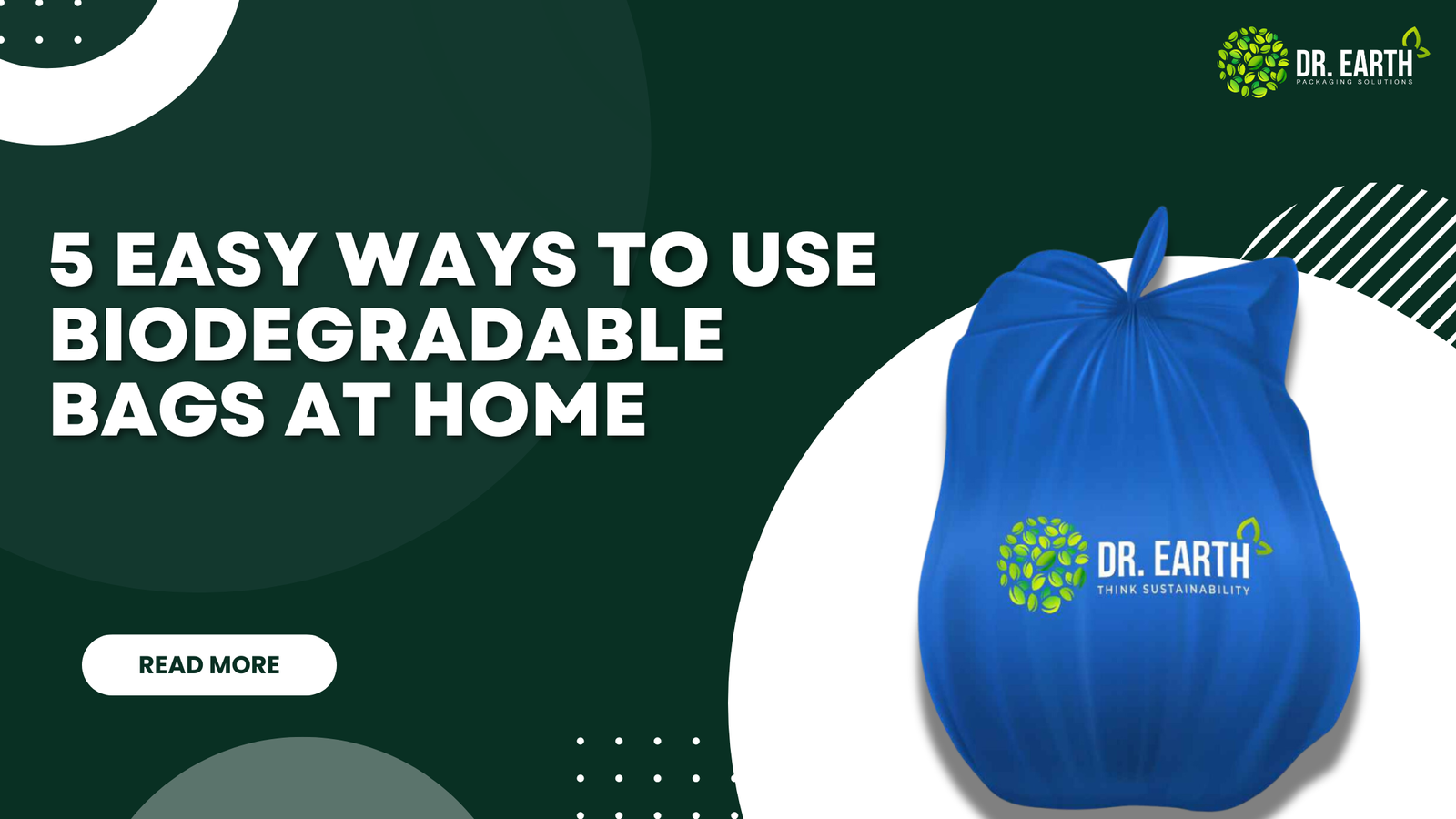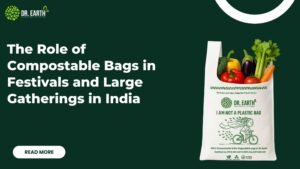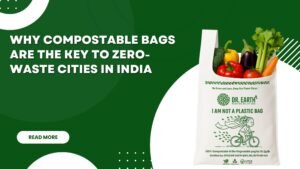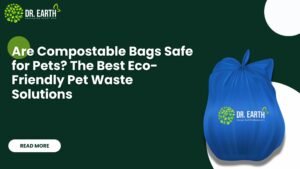
Sustainable lifestyles start with the tiniest of steps, one of which is bagging out of plastics and into biodegradable bags to cut down an individual’s environmental footprint. Dr. Earth has earned a name among providers of environment-friendly products and offers a number of biodegradable bags that will easily break down without any harmful residues. These biodegradable and compostable bags from Dr. Earth for handling various household needs, such as composting and storage, can help you bring an end to plastic waste with their great convenience.
We will discuss five practical ways to use Dr. Earth’s biodegradable bags at home in this guide that will give you a greener household and fulfill every day-to-day need.
1. Kitchen Composting and Food Waste Disposal
Why It’s Useful
Composting proves to be an effective method of recycling kitchen waste into nutrient-rich, less-waste-landfilled garden-friendly soil. However, traditional plastic bags interfere with composting processes. Now, using Dr. Earth‘s biodegradable bags, you can collect your food waste conveniently and responsibly dispose of them, knowing that they would decompose without harming the environment.
How to Use Biodegradable Bags for Composting
- Line Your Kitchen Compost Bin: Using Dr. Earth’s compostable bags, you can line your kitchen compost bin. This helps collect your kitchen scraps such as vegetable peelings and fruit skins as well as coffee grounds.
- Odor and Mess Control: Dr. Earth bags will help to contain odors and messes that should make it easier when transporting waste to an outdoor pile or municipal composting facility.
- Dispose in Your Garden Compost: If you have a backyard compost, Dr. Earth’s bags break down naturally, becoming nutrient-rich material that can help create a healthier garden.
Recommended Dr. Earth Product for Composting
Certified compostable products by Dr. Earth meet the appropriate ASTM D6400 standards, and hence they will break down well in composting environments.
2. Organizing and Storing Food
Why It’s Useful
Food can be stored and organized in a more earth-friendly manner through biodegradable bags. Dr. Earth’s biodegradable bags are made of plant-based materials and are safe for storing food instead of plastic. Ideal for pantries, refrigerators, and snacks, these bags help you maintain an organized kitchen without plastic waste.
How to Use Biodegradable Bags for Food Storage
- Store Dry Goods: Use Dr. Earth’s biodegradable bags for arranging your dry goods, rice, pasta, nuts, and dried fruits inside your pantry.
- Portion Fresh Produce: Keep your fruits and vegetables fresh for longer with your fridge. The biodegradable bags of Dr. Earth retain the moisture for longer shelf life.
- Reduce Plastic in the Kitchen: Its home-use bags allow you to replace plastic bags in the kitchen with a biodegradable alternative.
Recommended Bag Type for Food Storage
For pantry organization and refrigerated items, Dr. Earth’s food-safe biodegradable bags made from plant-based materials come out excellent choices. They are also non-toxic, making sure your food is protected during storage.
3. Pet Waste Management
Why It’s Useful
Pet waste is difficult to dispose of, mostly with the impact of plastic bags on the environment. Dr. Earth offers pet owners the chance to have a cleaner and greener way to dispose of pet waste.
How to Use Biodegradable Bags for Pet Waste
- Daily Walks: The Dr. Earth bags can be carried by pet owners during their daily walks around the house so that they can collect the waste and dispose of it responsibly.
- Scooping the Litter Pan: Scoop and throw out litter in biodegradable bags so that odors are trapped until trash collection
- Leak-Odorless Waste Management: The bags that Dr. Earth have created will limit on leakages and odors so you will be able to keep your waste in a more manageable condition.
Recommended Bag Type for Pet Waste
Dr. Earth pet waste bags are tough, leak-proof, and specifically designed to handle waste from pets. Therefore, they seem like a reliable and eco-friendly solution for pet owners.
4. Garden Waste Collection
Why It’s Useful
So much organic waste can be generated while keeping up the yard, especially grass clippings, fallen leaves, and other trimmings from plants. Organic bags could be very helpful to gather garden debris, which allows you to dispose of it in an environment-friendly way and even to compost if you have a yard waste compost bin.
How to Use Biodegradable Bags for Garden Waste
- Collect garden waste: You can carry leaves, weeds, and small twigs using light but strong biodegradable bags. This makes it very easy to carry your waste to the curbside collection or compost bin.
- Composting of Garden Waste: In this connection, after collecting all your garden debris, biodegradable bags can be added to your compost pile; these shall break down naturally together with your organic matter.
- Make compost or soil fertilizer: If you have a mulching system or an indoor compost setup at home, biodegradable bags can be part of the nutrients for your healthier landscape free of plastic residues.
Recommended Bag Type for Garden Waste
Heavy-duty biodegradable bags meant for outdoor or garden use will best serve your need. Look for compostable bags to ensure that the bags will break down well with garden waste.
5. Organizing and Decluttering Around the Home
Why It’s Useful
Biodegradable bags are fantastic for house cleaning. You could use it in cleaning out, donating, recycling, or just keeping stuff you might need but do not want to deal with right now. Substitution of biodegradable bags from plastic could help the home organize while minimizing plastic footprints of the household, doing the responsible act of disposing of things in your house.
How to Use Biodegradable Bags for Organization
- Temporary Storage Biodegradable bags can be used to store things you want to discard or relocate. You can make use of them to store your old clothes or more supplies.
- Biodegradable Clearing Out: Begin clearing the mess by ensuring that biodegradable bags are used in clearing away unwanted stuff responsibly.
Recommended Bag Type for Organization
Biodegradable bags are best suit for household goods that are heavy, strong, or bulky. Make use of compostable bags when you need to put an item inside a bag that can be reuse or recycled.
Conclusion
From biodegradable bags, doing daily chores becomes one of the most effortless ways to lower the footprint your household may give to the environment. When you introduce them into your home, you not only free yourself from using plastic but also make the earth a cleaner and greener place. Compost more easily, store your food and pet waste securely, maintain your garden pain-free, and so much more with biodegradable bags.
FAQs
Q- 1. Are biodegradable bags actually better for the environment?
Ans- Yes, biodegradable bags are prepare from materials that eventually decompose under natural conditions. This helps to reduce waste to a greater extent and minimizes pollution from plastic wastes as they dissolve faster than the traditional plastic bags and leave about no environmental impact.
Q- 2. How long does it take for biodegradable bags to decompose?
Ans- Biodegradable bags may take from a few months to years, depending on the environmental conditions and type of material that goes into making a bag. Bags made of certified compostable material in the industrial composting process may take up to 3-6 months for complete degradation.
Q- 3. Can I use biodegradable bags for long-term storage?
Ans- Biodegradable bags are appropriate for short- to medium-term storage. They start decomposing after some time and may happen more quickly in cases of light exposure, moisture, or high temperature .
Q- 4. Are all biodegradable bags compostable?
Ans-No, not all biodegradable bags are compostable. Some need industrial composting conditions, while others decompose only in specific environments. Make sure you look for certified compostable bags if you’re going to compost them at home.
Q- 5. Can biodegradable bags be use in the freezer?
Ans- No, Biodegradable bags cannot be freez as some of the material in biodegradable bag gets tough when kept under very low temperature. It is better to check the packaging for any specification on storage.
Share:
Related Posts














